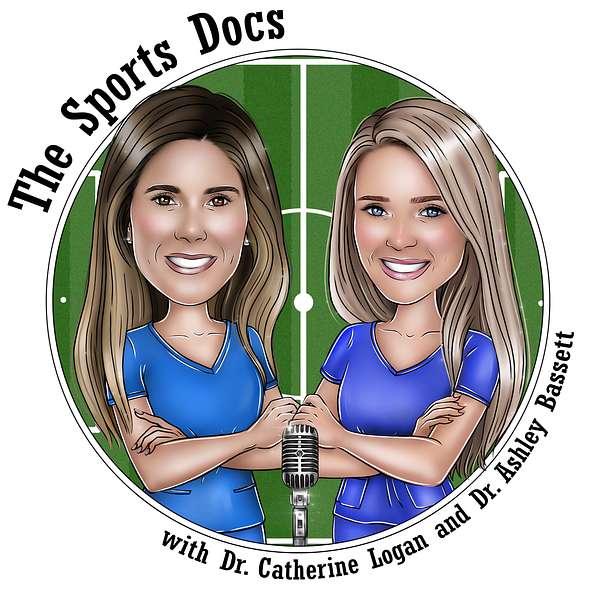
The Sports Docs Podcast
Sports medicine is a constantly evolving field, with hundreds of new articles published each month on the topic. This ever-growing wealth of information can make it challenging to stay updated on the newest approaches and techniques, and to know which data should actually change your practice. Join orthopedic surgeons, Dr. Catherine Logan and Dr. Ashley Bassett, as they chat about the most recent developments in sports medicine and dissect through all the noise.
On each episode of The Sports Docs podcast, the hosts will tackle a specific injury – from ACL tears to shoulder instability – and review the top research from various high-impact journals that month, including The American Journal of Sports Medicine, Arthroscopy: The Journal of Arthroscopic and Related Surgery, Sports Health, Journal of Shoulder and Elbow Surgeons, and more. The Sports Docs will also be joined by experts in the field of sports medicine – orthopedic surgeons, nonoperative sports medicine specialists, athletes, physical therapists, athletic trainers and others – to provide a fresh and well-rounded perspective based on their unique experiences.
The Sports Docs – Dr. Logan & Dr. Bassett – are friends & former co-residents from the Harvard Combined Orthopaedic Residency Program, who went onto esteemed sports medicine fellowships at The Steadman Clinic and The Rothman Institute, respectively. Dr. Logan practices in Denver, CO, and serves as Team Physician for Men's USA Lacrosse & as a Team Physician for U.S. Ski & Snowboard. Dr. Bassett is the director of the Women’s Sports Medicine Center at the Orthopedic Institute of New Jersey and practices across northern NJ, primarily in Morris and Sussex Counties.
Together, they will bring monthly conversations on how to care for athletes of all ages and levels of play, with a healthy mix of cutting-edge science and real-world application.
The Sports Docs Podcast
24. Dr. Clayton Nuelle: Cartilage Injuries of the Knee - Part I
On today’s episode we’re focusing on cartilage defects of the knee with Dr. Clayton Nuelle, Assistant Clinical Professor at the University of Missouri and team physician for Mizzou athletics. His current research focuses on improving cartilage restoration and joint preservation techniques, so we are very excited to have him join us for our discussion today.
We have some great articles for you that contribute well to our conversation on the surgical treatment of knee cartilage disease. The first article is a level I prospective RCT published in the May 2018 issue of AJSM titled “Matrix-Applied Characterized Autologous Cultured Chondrocytes Versus Microfracture – Five Year Follow-up of a Prospective Randomized Trial.” This multicenter study was performed at 14 sites across 7 different countries. Patients with symptomatic full thickness cartilage defects greater than 3 cm in size and involving the femoral condyle or trochlea were randomized to either the MACI procedure or microfracture procedure. If you’re not familiar with the MACI procedure, we definitely recommend checking out our last Overtime episode where we do a deep dive into the details of that surgical technique.
In this 5-year clinical trial, Brittberg and colleagues found that while both groups significantly improved after surgery, patients who underwent the MACI procedure were both clinically and statistically significantly better at 5 years compared to patients who underwent microfracture.
Then, from the February issue of AJSM this year, we review the publication titled “Isolated Osteochondral Autograft versus Allograft Transplantation for the Treatment of Symptomatic Cartilage Lesions of the Knee.” Bryan Saltzman and his team at OrthoCarolina performed a systematic review of level I and II studies investigating osteochondral transplant techniques.
This systematic review concluded that both OATs and OCA resulted in favorable patient outcomes and graft survival rates at 5-year follow up, with no significant differences between the two. The autograft group was significantly younger, had smaller defect size, used a larger number of plugs and more frequently treated medial femoral condyle lesions. The allograft group had a larger number of patients with lateral femoral condyle and trochlear lesions.
We are joined today by Dr. Clayton Nuelle, a board-certified fellowship-trained orthopedic sports medicine surgeon and Assistant Clinical Professor at the University of Missouri. Dr. Nuelle obtained his medical degree from Loyola University and completed his orthopedic residency at the University of Missouri, where he received numerous awards. He then stayed at the University of Missouri to complete a fellowship in sports medicine. Dr. Nuelle is very active in research and has authored numerous peer reviewed publications, journal articles and textbook chapters. He is an Associate Editor for the Arthroscopy Journal and is a member of multiple Orthopaedic society committees and boards.